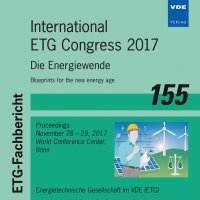80% PV and wind based energy supply: cross sector advantages for efficient system designs
Konferenz: International ETG Congress 2017 - International ETG Congress 2017
28.11.2017 - 29.11.2017 in Bonn, Deutschland
Tagungsband: International ETG Congress 2017
Seiten: 6Sprache: EnglischTyp: PDF
Persönliche VDE-Mitglieder erhalten auf diesen Artikel 10% Rabatt
Autoren:
Eckerle, Richard (Universität der Bundeswehr München, Neubiberg, Germany)
Inhalt:
To significantly reduce greenhouse gas emissions, future electric energy systems need to integrate a high share of fluctuating photovoltaic (PV) and wind energy production as the currently most cost efficient scalable renewable technologies. Furthermore, focus needs to be extended from electric energy demand only to heating and mobility. Research results at the Universität der Bundeswehr München demonstrate the advantages of such a cross-sector approach. By using low-cost heat storage devices an above 80% PV and wind energy integration is possible. While simple power-to-heat designs require a high share of wind production, more sophisticated systems include heat pumps, CHP and small battery storage devices. Heat storage capacity and renewable energy production is strongly reduced, production mix flexibility is increased and residual load demand of power and heat can be matched without additional external power supply. As a consequence, an actively managed energy cell structure, autonomous but connected, could significantly support our current energy transformation challenge.


